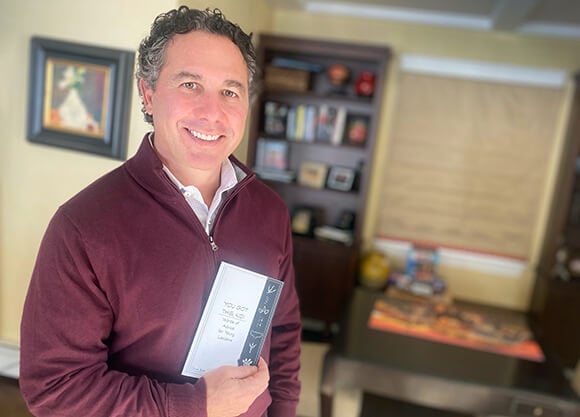
Book offers leadership lessons; proceeds benefit Lupus and environmental sustainability studies
February 16, 2021

February 16, 2021

Nearly 20 years ago, Saia emerged as the last person out of Two World Financial Center, which was connected to the badly damaged World Trade Center towers. But as Saia and others headed south through the smoke-filled streets of lower Manhattan, it soon became clear they were going the wrong way.
“When the first building came down, we ran. We ran to the end of the island where the Hudson River meets the East River,” Saia said. “I had a choice — to either drop in or be consumed by the smoke. And then, someone yelled, ‘We can breathe through this. It’s secondary smoke.’ To make a long story short, I ran out of lower Manhattan. I do believe I was the first person out of lower Manhattan covered in gray [ash] … and I got to live my life.”
Today, Saia is a senior partner at Deloitte, an author and a Quinnipiac board member. On Feb. 11, he joined President Judy Olian for an hour-long conversation to address his new book, “You Got This, Kid! Words of Advice for Young Leaders.” The discussion was part of Olian’s virtual speaker series, “The Way Forward.” The series features thoughtful exchanges with industry visionaries about today’s social, economic and health challenges.
Buy "You Got This, Kid! Words of Advice for Young Leaders"
Saia’s new book is composed of seven stories drawing analogies between the animal kingdom and the corporate jungle, from scorpions and armadillos to dolphins and dogs. All proceeds from “You Got This, Kid! Words of Advice for Young Leaders” go to the Saia Family Fund at Quinnipiac, which benefits Lupus research and environmental sustainability efforts.
One of the book’s most popular stories details the metamorphosis of a caterpillar to a butterfly. Saia is quick to point out that only 10 percent of caterpillar eggs survive to become butterflies. The odds are much the same to reach the top tier of success in the business world.
“A lot of people gravitate to this chapter because it is about them starting their career and how quickly they can get to butterfly. A lot of people confuse that with financial outcome,” Saia said. “You can be in your early 20s and get to a financial outcome where you think that’s the butterfly stage. It’s not. … It’s about continuous development and staying hungry throughout the life cycle of your career and never letting up on how you learn.”
Another story is about the Mandarin duck, a rare bird with elegant feathers painted straight from a Crayola box. Although Mandarin ducks are native to China and Japan, one was spotted in New York City’s Central Park in 2018 and 2019.
Saia cited the Mandarin duck as an example of differentiation: What makes you stand out? What is your secret sauce? It’s incumbent for young leaders, especially those in the early stages of their careers, to perform tasks with enthusiasm and a willingness to learn, he said.
It’s also important to show management you’re part of the team, Saia said. He encouraged young leaders to be curious and think about ways to improve the business through efficiencies and other ideas.
But if you’re not getting feedback and you’re not growing, it might be best to move on. “If your colors aren’t appreciated, leave the pond,” Saia suggested.
For Olian, the lessons in Saia’s book are pragmatic and purposeful, even for the established and successful members of her leadership team.
“We already use these animals with our leadership team to ascribe experiences in people,” Olian said. “It really does stick to you.”
In the book’s final analogy, Saia writes about dogs and the importance of diversity in business. Instead of leveraging one kind of dog — a German shepherd — Saia explains how diversity is the lifeblood of a thriving, innovative, inclusive business.
“There are countless stories in my career where I had diverse teams and diversity of thought,” Saia said. “And because of that diversity of thought, we had very powerful, strategic ambitions together … that frankly, we could not have achieved without diversity of thought in the room. It’s as simple as that.”
Donations can be made directly to the Saia Family Fund at Quinnipiac University

Quinnipiac Today is your source for what's happening throughout #BobcatNation. Sign up for our weekly email newsletter to be among the first to know about news, events and members of our Bobcat family who are making a positive difference in our world.
Sign Up Now